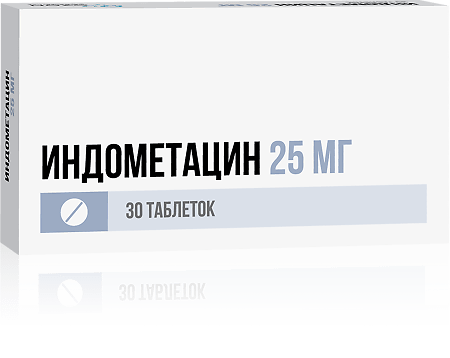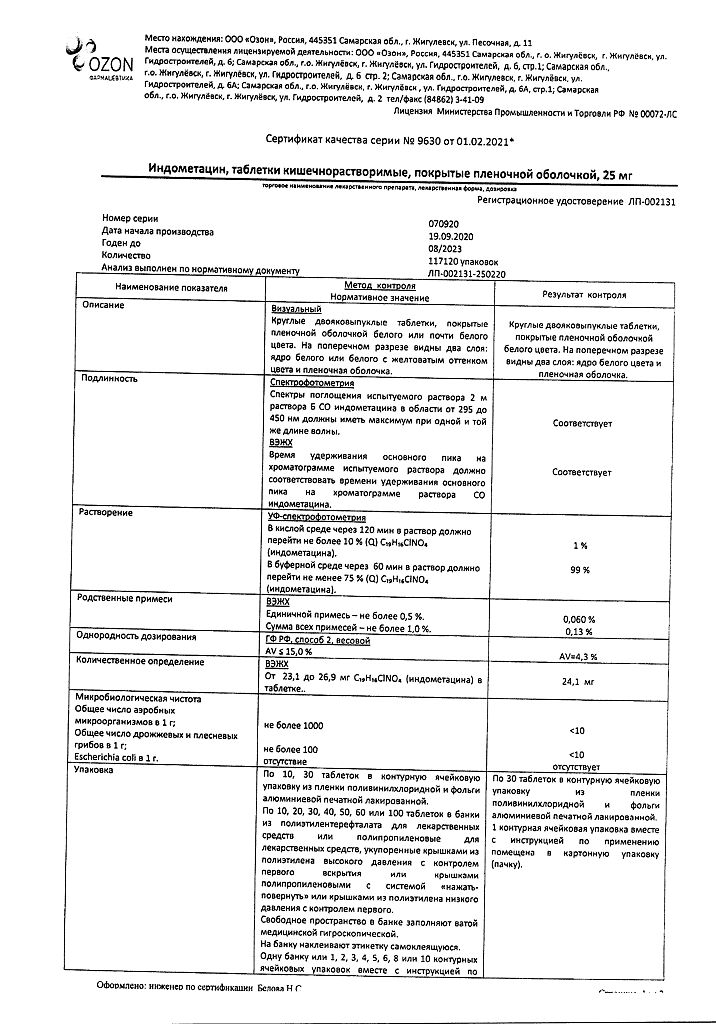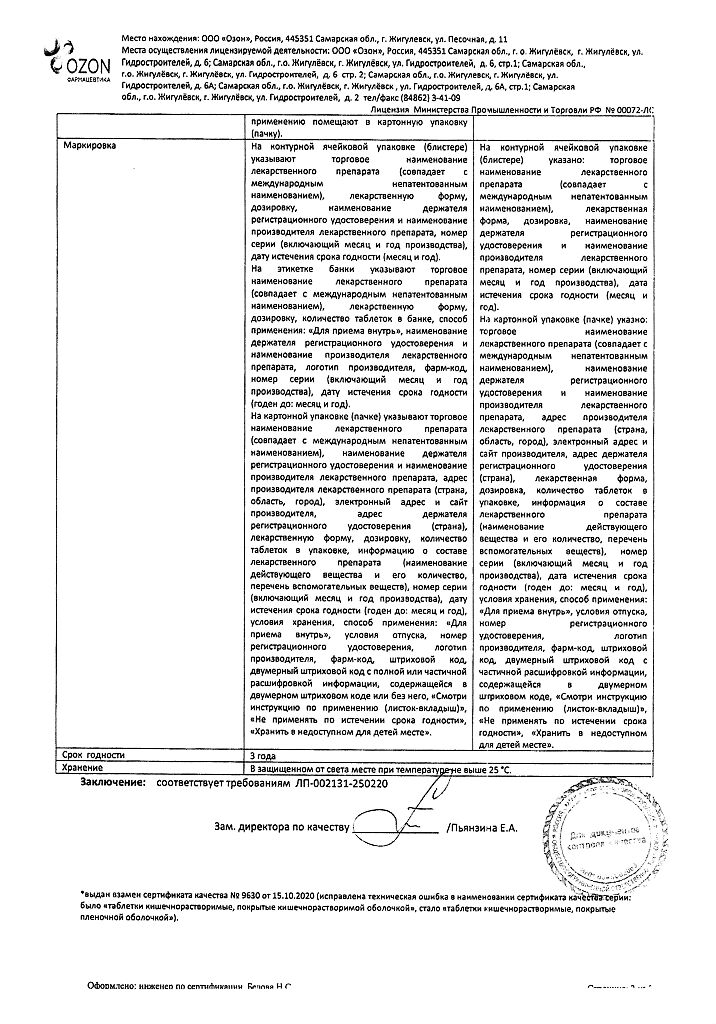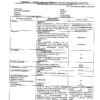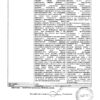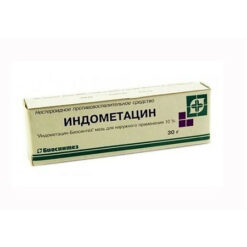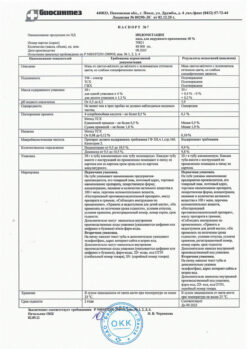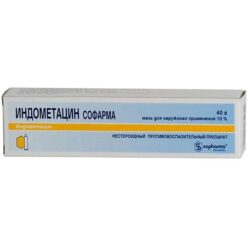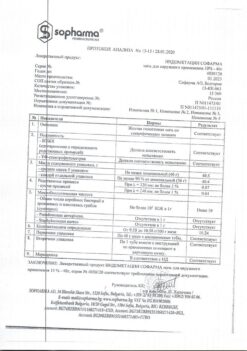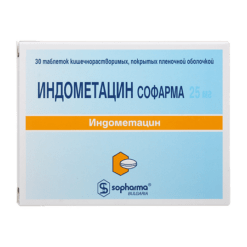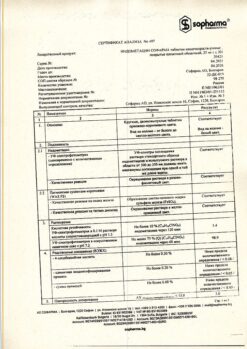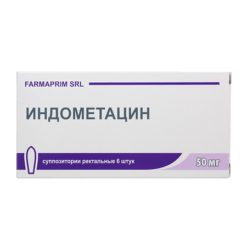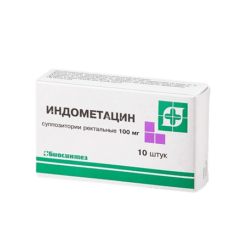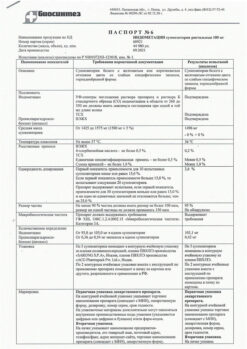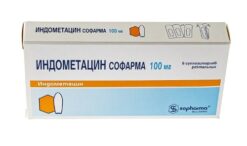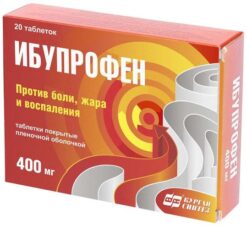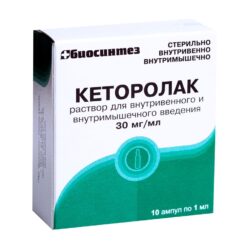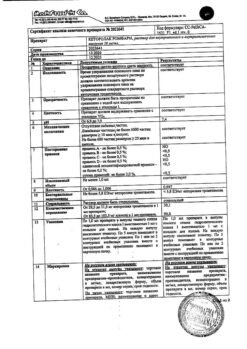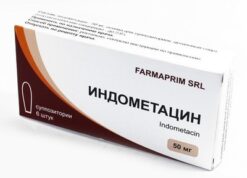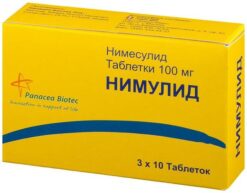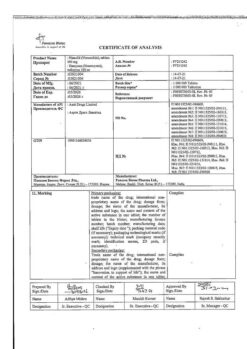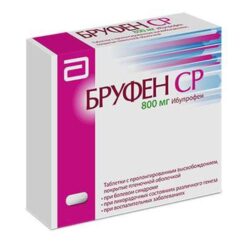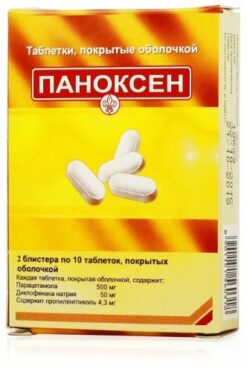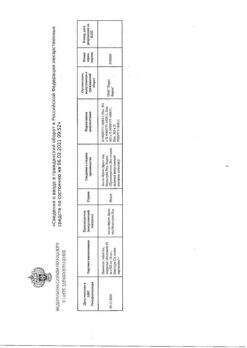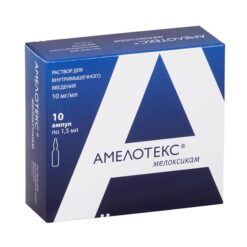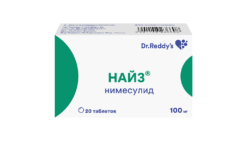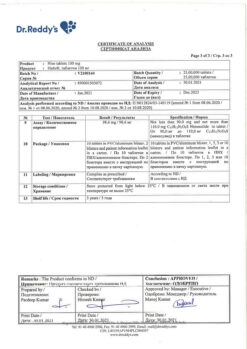No products in the cart.
Indomethacin, 25 mg 30 pcs
€1.00
Out of stock
(E-mail when Stock is available)
Description
Indomethacin has anti-inflammatory, analgesic and antipyretic, as well as some antiaggregant action. It suppresses the activity of anti-inflammatory factors, reduces platelet aggregation. By inhibiting cyclooxygenase 1 and 2 it disrupts arachidonic acid metabolism, decreases quantity of prostaglandins (Pg) both in inflammation focus and healthy tissues, inhibits exudative and proliferative phases of inflammation.
When used topically, it causes alleviation or disappearance of pain syndrome of rheumatic and non-rheumatic character (including In case of pain in the joints at rest and when moving, it reduces morning stiffness and joint swelling, increases the range of motion; in case of inflammatory processes after operations and injuries, it quickly relieves spontaneous pain as well as pain while moving, reduces inflammatory swelling of the wound area).
Indications
Indications
For systemic use: joint syndrome (rheumatoid arthritis, osteoarthritis, ankylosing spondylitis, gout), spine pain, neuralgia, myalgia, traumatic inflammation of soft tissue and joints, rheumatism, diffuse connective tissue disease, dysmenorrhea. As an aid in infectious and inflammatory diseases of the ENT-organ, adnexitis, prostatitis, cystitis.
For local use: prophylaxis of inflammation during surgical procedures for cataract and anterior segment of the eye, inhibition of miosis during surgery.
Active ingredient
Active ingredient
Composition
Composition
Active substance: indomethacin 25 mg
How to take, the dosage
How to take, the dosage
Orally, during or after meals, with milk, in an initial dose of 25 mg 2-3 times a day in adults. In case of insufficient clinical effect the dose is increased to 50 mg 3 times a day. The maximum daily dose is 200 mg. In case of achieving the effect, the treatment is continued for 4 weeks in the same or a reduced dose. In long-term use, the maximum daily dose is 75 mg.
Special Instructions
Special Instructions
With caution is used in elderly patients, as well as in patients with a history of liver, kidney, GI diseases, dyspeptic symptoms at the time of use, arterial hypertension, heart failure, immediately after major surgical interventions, parkinsonism, epilepsy.
With indications in the anamnesis of allergic reactions to NSAIDs is used only in emergency cases.
During treatment, systematic monitoring of liver and renal function, the picture of peripheral blood.
Simultaneous use with acetylsalicylic acid and other NSAIDs is not recommended.
Do not use indomethacin concomitantly with diflunisal.
When concomitant use of indomethacin with lithium drugs, be aware of the possibility of symptoms of toxic effects of lithium.
When used topically, should not be applied to the wounded surface of the skin, and avoid contact with the eyes or mucous membranes.
Influence on driving and operating machinery
During the treatment it is necessary to refrain from potentially dangerous activities that require concentration and increased speed of psychomotor reactions.
Contraindications
Contraindications
Side effects
Side effects
Digestive system disorders: nausea, anorexia, vomiting, abdominal pain and discomfort, constipation or diarrhea, erosive ulcerative lesions, bleeding and perforations of the gastrointestinal tract; rarely – intestinal strictures, stomatitis, gastritis, flatulence, bleeding from the sigmoid colon or from diverticulum, jaundice, hepatitis.
CNS and peripheral nervous system disorders: dizziness, headache, depression, fatigue; rarely – anxiety, fainting, somnolence, seizures, peripheral neuropathy, muscle weakness, involuntary muscle movements, sleep disorders, mental disorders (depersonalization, psychotic episodes), paresthesia, dysarthria, parkinsonism.
Cardiovascular system disorders: edema, increased BP, tachycardia, chest pain, arrhythmia, palpitation, arterial hypotension, congestive heart failure, hematuria.
Allergic reactions: rare – itching, urticaria, angiitis, erythema nodosum, skin rash, exfoliative dermatitis, Stevens-Johnson syndrome, erythema multiforme, toxic epidermal necrolysis, hair loss, acute respiratory distress, severe BP drop, anaphylactic reactions, angioneurotic edema, dyspnea, bronchial asthma, pulmonary edema.
Hematopoietic system disorders: rarely – leukopenia, petechias or ecchymoses, purpura, aplastic and hemolytic anemia, thrombocytopenia, DIC syndrome.
Sense organs: rarely – visual disturbances, diplopia, orbital and periorbital pain, tinnitus, hearing disorders, deafness.
Urinary system disorders: rarely – proteinuria, nephrotic syndrome, interstitial nephritis, renal failure.
Metabolism: rarely – hyperglycemia, glucosuria, hyperkalemia.
Others: rare – vaginal bleeding, hot flashes, increased sweating, nasal bleeding, enlargement and tightness of the mammary glands, gynecomastia.
Local reactions: at the site of injection in/m in some cases – formation of infiltrates, abscesses; with rectal administration irritation of the rectal mucosa, tenesmus, exacerbation of chronic colitis are possible.
In external application: itching, redness, rash in the application area.
Overdose
Overdose
Symptoms: nausea, vomiting, severe headache, dizziness, memory impairment, disorientation. In severe cases paresthesias, numbness of extremities, seizures.
Treatment: symptomatic therapy. Hemodialysis is ineffective.
Similarities
Similarities
Additional information
| Shelf life | 5 years |
|---|---|
| Conditions of storage | In a dry, light-protected place, at a temperature below 25 °C. |
| Manufacturer | Ozon, Russia |
| Medication form | enteric soluble tablets |
| Brand | Ozon |
Other forms…
Related products
Buy Indomethacin, 25 mg 30 pcs with delivery to USA, UK, Europe and over 120 other countries.

